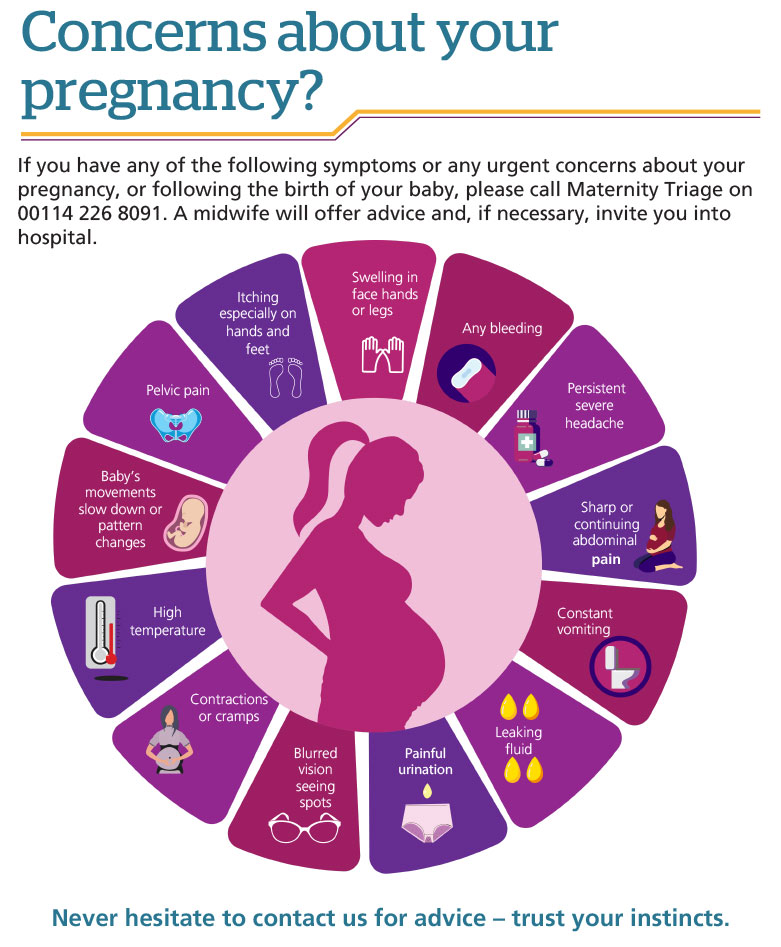Labour
Stages of Labour
1st stage: Contractions make your cervix gradually open (dilate)
Regular, painful contractions can mean that your labour has begun. These contractions will progress and become more intense and you may experience an increase in length, strength and frequency.
The contractions play a vital role in pushing your baby down and opening your cervix, the opening of your womb, to ready you for the birth of your baby.
Our Maternity Assessment Centre, (MAC) s open 24 hours a day, 7 days a week, where our midwives are on hand to offer the support you may need. Please telephone our MAC:
- If you are worried about anything
- You feel your labour has started.
- If your think you waters have broken
MAC can be contacted on 0114 226 8091
We may advise you to stay at home until your contractions become regular and more frequent or invite you in for an assessment. Or if you are booked to have a homebirth, we may ask the community midwife to visit you at home and assess you.
If your labour is still in the early stages and you are managing okay with the contractions we may recommend that you return home until labour becomes more established.
This is usually the longest stage of labour.

2nd Stage: When cervix is fully dilated until the birth of your baby
The 2nd stage of labour starts from when your cervix is fully dilated until when your baby is born and is usually the most intense stag of labour. At this point you will be given a private room.
You may want to explore different positions, and also consider your pain options and how your birthing partner can support you.
3rd stage of labour: Birthing the placenta
This is the delivery of the placenta and it happens after you’ve had your baby. Usually there are two options available:
- Active: this is an injection to make your womb contract which often leads to the placenta being delivered faster.
- Physiological: you can wait for this to happen naturally.
Packing your bag for hospital
As you approach 36 weeks of pregnancy, we encourage you to start packing a bag ready for you and your baby regardless of where you are planning to give birth. You will normally stay in hospital from six hours to two days following the birth of your baby—therefore you need only bring enough clothes and other personal items for this length of time. If you stay longer you can ask friends or relatives to bring extra things for you. Whatever you decide to bring is your personal choice. We have put together some suggestions below.
- Any hospital notes, a copy of your birth plan and list of contact telephone numbers
- An old t-shirt for labour or any comfortable clothing (including something to wear in the birthing pool if you wish)
- Pair of socks for labour
- Personal items—toiletries, tissues, tennis ball or wooden massager, massage oils, pillow, water spray, lip salve
- Toiletries including soap, toothbrush, toothpaste and lip balm
- Hair bands or clips for long hair
- Energy tablets
- Snacks, magazines, newspapers, puzzle books (for you and your partner)
- Change for the carpark and phones
- Breast pads
- Maternity pads and disposable knickers
- Towel
- Support bra to wear while breastfeeding
- Dressing gown, slippers, nightwear
- Music—CDs or iPod
- Camera
- Comfortable clothing to go home in
- Car Seat for Baby
- Phone Charger
Note: Please leave painkillers at home. We normally prescribe paracetamol and ibuprofen. Please ensure you are not allergic to or have any sensitivities to these medications before taking them.
Your Birthing Partner May want to bring:
- Comfortable clothing (remember it gets very warm in the unit) and a change of clothes
- Suitable indoor footwear (flip flops or slippers)
- Toiletries
- Meals and snacks (please note only birthing parents receive hospital meals in the maternity unit)
For your baby
- Baby grows
- Vests and cardigan
- Hat
- Baby bath towel
- Nappies
- Cotton wool
- Baby blanket
If you are choosing to bottlefeed please bring your bottles and formula
Support after your birth
You and your baby will be cared for and supported by our midwifery team. This will include
- Unhurried skin to skin contact
- Help to identify feeding cues
- Offering the first feed in skin to skin contact and support to breast or bottle feed your baby
- Carrying out your babies first checks.